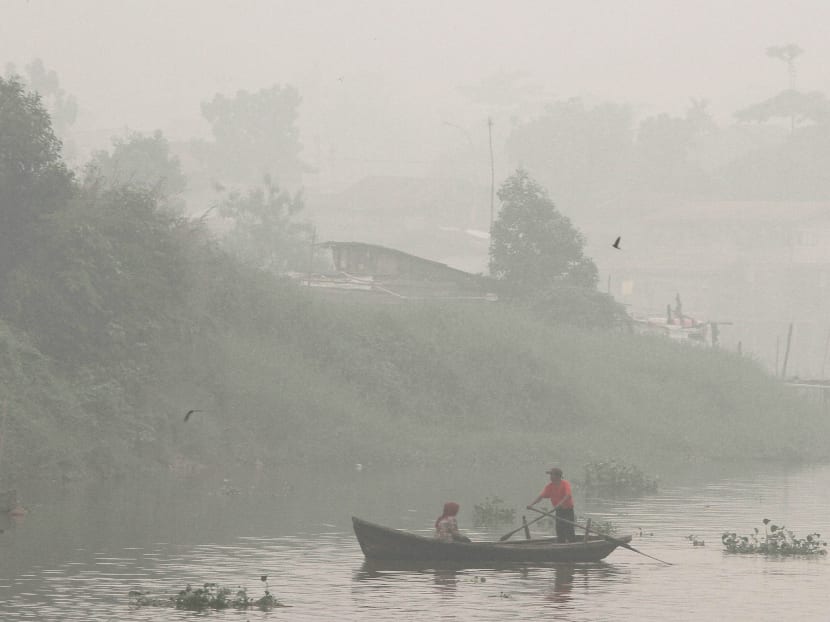Low visibility causes boat crash in Sumatra as haze hits Thailand
JAMBI/BANGKOK — Two persons were killed in a speedboat crash caused by poor visibility in the Indonesian province of Jambi, which has been enveloped in thick haze for months.

A man rows a boat on Siak River as thick haze from wildfires blanket the city in Pekanbaru, Riau province, Indonesia, on Oct 5, 2015. The speedboat’s skipper said he was unable to see well when docking the vessel amid thick haze on Sunday morning. Photo: AP
JAMBI/BANGKOK — Two persons were killed in a speedboat crash caused by poor visibility in the Indonesian province of Jambi, which has been enveloped in thick haze for months.
Skipper Daenk Manggata, 45, said he was unable to see well when docking the vessel amid thick haze on Sunday morning (Oct 4), sending the speedboat into a column before it capsized with 18 on board.
A crew member, identified as 26-year-old Amirduin, and 60-year-old passenger Subaidah were killed in the incident while the rest of those on board were rescued by port officials and bystanders, reported Jakarta Globe.
Local authorities estimated visibility at just 100m at the time of the accident.
The accident in Jambi, which is on the island of Sumatra, comes amid one of South-east Asia’s most serious environmental pollution, which has persisted for about a month.
Schools in Malaysia and Singapore have closed when the haze has been heavy, sports events have been cancelled and tourism operators are fretting. Health authorities across the region have warned people to avoid exercise on bad days.
The haze has also spread to Thailand yesterday, the first time it has reached hazardous levels so far north, highlighting the regional nature of a problem that is being blamed on Indonesia’s inability to prevent big plantation companies from burning forests to clear land for new trees.
Thai environment officials said the level of pollution from Indonesia has risen sharply in the south of the country, near the Malaysian border, and health authorities were issuing face masks and opening hotlines to provide advice.
Dr Wijarn Simachaya, the director general of Thailand’s Pollution Control Department, told The Associated Press that “the situation is getting worse”.
“We didn’t think it would be bad this year, but it is,” he said.
Indonesia has come under pressure in the past few weeks to contain the annual haze crisis, which is caused by slash-and-burn agriculture on Sumatra island and the Indonesian part of Borneo island.
Companies seeking to clear land for palm oil and pulp wood plantations have been accused of encouraging the fires that often smoulder for weeks in underground peat deposits.
The problem has been exacerbated this year by the El Nino weather phenomenon, which has brought unusually dry conditions.
Indonesia says more than 200 companies, most of them from South-east Asia, are being investigated on suspicion of causing fires.
The Indonesian police said yesterday that one company from Australia, palm oil plantation operator PT Kayung Agro Lestari (KAL), and one from China were among them.
A representative of KAL, a subsidiary of PT Austindo Nusantara Jaya Agri, said it was “not accurate to call KAL an Australian company” and that only 0.01 per cent of it was owned by an Australian citizen. He said the company was cooperating with the investigation.
The police did not identify the Chinese company.
Indonesia has repeatedly declined offers of help from neighbouring countries to help put out the fires. AGENCIES






